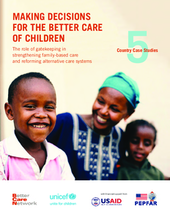Published jointly with UNICEF, this new BCN Working Paper focuses on the role of gatekeeping in strengthening family-based care and reforming alternative care systems. Gatekeeping refers to systematic procedures aimed at ensuring that alternative care for children is used only when necessary, and that the type of care provided is suitable to the individual child. This Working Paper reviews different approaches to gatekeeping in five countries--Brazil, Bulgaria, Indonesia, Moldova, and Rwanda--to consider what has and has not worked, to analyze lessons learned from practice, and to reflect on the implications for improving policy and programs in this area. The Working Paper is based on a global literature review and key informant interviews with national and international child-care reform experts.
The Working Paper notes that while much progress has been made in improving gatekeeping, particularly within formal child-care systems, many challenges remain. The Working Paper identifies several fundamental requirements for moving forward, including: the need for a dedicated mechanism of experts who review individual cases and make recommendations; a legal and normative framework in line with international human rights practices and standards that supports both formal and non-formal gatekeeping mechanisms; availability of alternative care options; tools, protocols, and standards for gatekeeping that are tailored to the specific, local context; and increased political and financial commitment for approaches to provide community services and prevent unnecessary child-family separation.

